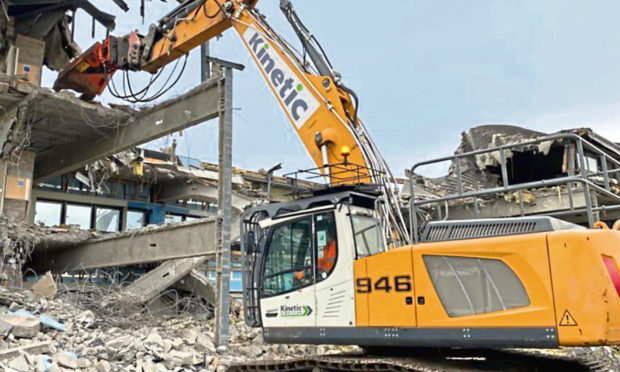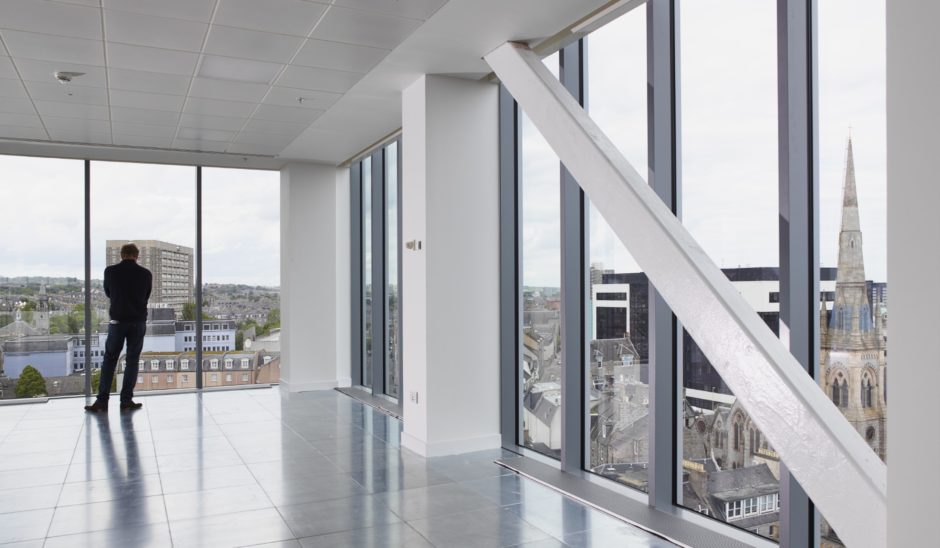The latest Aberdeen Report by international property giant Knight Frank paints a gloomy picture of commercial markets in the Granite City.
Eric Shearer, partner and head of the firm’s Aberdeen office, admitted there wasn’t much to be optimistic about just now.
“It’s all about demolition and empty property business rates,” Mr Shearer said.
The “pretty grim” Aberdeen Report contains more lowlights than highlights, but there are some promising signs for the industrial market, he said.
At least 15 office blocks were earmarked for demolition last year in Aberdeen, compared with only nine in 2019.
Wrecking balls have swung at a raft of sites where property owners have chosen to turn office buildings – in some cases perfectly good ones – to rubble, rather than keep paying high business rates, with only limited relief available after the first three months.
Calling for change, Knight Frank’s report says: “We sincerely hope that someone in the position of power makes sense of the current business rates system, adapting it for the times we live in.
“It simply is not fair as it exists and leads to behaviour that is wasting perfectly good buildings and is without doubt environmentally unsustainable.”
Mr Shearer warned the impact of Covid-19 may have caused lasting damage for the city centre office market.
Firms were previously enthusiastic to relocate into new buildings on or near to Union Street, but a likely preference for using cars rather than public transport during and beyond the pandemic could swing the pendulum back to employers favouring locations with on-site parking, he said.
Office requirements will change, with more people wanting to work flexibly in future – meaning “easy in, easy out” deals and not long-term tenancies are likely to become the market norm, he added.
Council convert
Despite his concerns about what this and also an ailing bricks and mortar retail sector will mean for the city centre over time, Mr Shearer said he had recently become a “convert” in terms of his support for the local authority and its efforts to improve Aberdeen.
“I’m going to have to eat my words,” he said, adding his scepticism of the past had given way to admiration for Aberdeen City Council moving ahead with major projects like Teca, the art gallery and a revamp of Union Terrace Gardens.
Knight Frank says the office market will see a continued “flight to quality” to modern, energy-efficient, open-plan accommodation, with a growing number of firms embracing “blended” working arrangements.
Significant activity in the city’s industrial market is expected in the second half of the year, once Covid-19 restrictions have eased and confidence returns to the workplace.
Increased competition, particularly from new-build properties, is forecast to put pressure on headline rents in the second-hand office market.
Land values will likely remain flat for the next two years, despite “demand on all fronts”, Knight Frank says.
Digital Aberdeen
In wider property markets, the company expects the private rental, build-to-rent and affordable housing sectors to grow rapidly on the back of “massive” investment.
And among the brighter predictions in the report, Knight Frank says cities like Aberdeen that have made digital infrastructure a priority will “carry favour” in the location choice of companies looking for a home.
Introducing the report, Mr Shearer and his Aberdeen team say 2020 was “meant to herald a period of relative calm”, allowing firms to move forward with short and longer-term occupational strategies.
But the global spread of Covid-19 and containment measures imposed “quickly reversed optimism, altered business focus and hindered transactional ability”, they add.
Flats plan for £1.5 million former oil and gas HQ in Aberdeen
Could new Scottish business rates spark wave of building demolitions?


